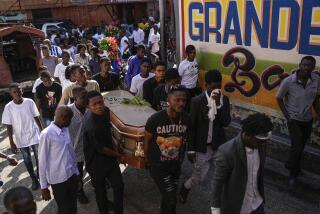Aristide Calls on People, Local Officials for Peace in Troubled Countryside
- Share via
PORT-AU-PRINCE, Haiti — In an urgent speech aimed at rural Haitians and boat people in exile, President Jean-Bertrand Aristide appealed Saturday for peace in Haiti’s countryside, where human rights groups report continued beatings and killings of civilians.
Speaking on national television and radio from the dining room table of his heavily guarded home, Aristide called on the more than 550 rural “section chiefs”--once the enforcers of Haiti’s military regime--to put down their weapons and stop attacking the peasants.
At the same time, the president pleaded with the rural masses who form his grass-roots support not to take revenge, even against section chiefs who human rights groups said killed at least four people in remote towns in the past two weeks.
Instead, Aristide suggested that victims of rural violence take their cases to the courts--which, however, have all but ceased to function in most of the country. And he appealed for patience as the nation’s Parliament plods through legislation aimed at enabling newly appointed local officials to launch an era of civil justice in the countryside.
“Let us live as brothers and sisters as we are straining the coffee of democracy through the filter of justice,” Aristide declared, adding later, “We don’t want the people to retaliate. . . . We know there is a need for justice. But we also know violence attracts violence.”
After the speech, the president told reporters he hoped his message would reach Haitian boat people living at the U.S. Naval Base at Guantanamo Bay, Cuba, who he said are still afraid to come home.
“People are expressing concerns about violence coming from the section chiefs, and when those who are in Guantanamo now hear reports like that, they are not encouraged to come back,” he said. “. . . Now this move puts me into a better position to tell them, ‘You will get a safer environment.’ ”
Human rights groups say the section chiefs are continuing to terrorize civilians in several isolated spots in the countryside, outside the protection of the 16,000-member U.S. military intervention force. The groups gave the names of several individuals believed to be behind the attacks.
Aristide’s message, crafted and broadcast after he met Saturday morning with the deputy commander of the U.S. force, also appeared to be directed at the American military command, which has covered about 27 towns with Special Forces units but has failed to reach remote villages where remnants of the old regime continue to rule.
But throughout his news conference--Aristide’s second since his Oct. 15 return from exile and his first from the recently renovated suburban villa he reclaimed as his home Friday--Aristide was upbeat about the U.S. military intervention and the progress of rebuilding the institutions of democracy.
“Now we have reached the point where we can disarm in a peaceful way the section chiefs and (paramilitary attaches) ,” he said, when asked whether he was satisfied with the American military’s disarmament efforts.
Underscoring Aristide’s comments, U.S.-led forces found a cache of mortars, grenades and ammunition, an official said Saturday.
The weapons, found in a tunnel Friday in Port-au-Prince, were turned over to the U.S. military, and no arrests were made.
Aristide also said he was “satisfied” with the pace of Parliament, which has been bogged down in procedural debates over Aristide’s prime ministerial appointee, Smarck Michel.
The president, who has kept to the Presidential Palace and his suburban home since his arrival, said he hopes to move out into the public limelight soon.
“I want to be there,” he said. “I’m still here because I have a lot to do. But, at the same time, I try to do my best for the people who are in charge of my security.”
More to Read
Sign up for Essential California
The most important California stories and recommendations in your inbox every morning.
You may occasionally receive promotional content from the Los Angeles Times.










